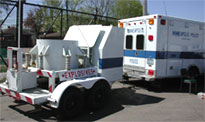April 24th, 2019 Guest Post – Meuser Law Office, P.A. “Death and Dependency Benefits”
 When a work-related injury or condition is a substantial factor in causing an employee’s death, the employee’s dependents are entitled to certain benefits under the Workers’ Compensation Act. This is referred to as a “dependency claim.” If an injured worker dies due to a work injury, the injured worker’s spouse, children, or other dependent family members may be entitled to benefits.
When a work-related injury or condition is a substantial factor in causing an employee’s death, the employee’s dependents are entitled to certain benefits under the Workers’ Compensation Act. This is referred to as a “dependency claim.” If an injured worker dies due to a work injury, the injured worker’s spouse, children, or other dependent family members may be entitled to benefits.
Who is entitled to dependency benefits?
Typically, a dependency claim is brought by a decedent’s spouse or children. A spouse is presumed to be dependent unless the employer and insurer can show that the spouse and the decedent were voluntarily living apart at the time of death. The court has interpreted “voluntarily living apart” liberally, looking the spouse’s intention and whether it was the spouse’s desire to live apart from the decedent permanently. A decedent’s child is presumed to be dependent if the child is under the age of 18 or is under the age of 25 and attending school full-time. A decedent’s child is also presumed to be dependent when the child is physically or mentally incapacitated from working. Extended family members (e.g., mother, father, siblings, in-laws, etc.) may be entitled to benefits if they were partially or fully supported by the decedent.
What benefits are dependents entitled to?
The amount of compensation dependents receive depends on the decedent’s wages at the time of injury—not at the time of death. This means that dependents are entitled to monetary compensation even if the decedent was retired at the time of his or her death. The amount a dependent receives also depends on how many dependents a decedent has (e.g., spouse, number of children, etc.). There are complex rules about how much dependents will receive and the duration of benefits. This largely depends on the total number of dependents and when the death occurs (i.e., which version of the law applies).
In addition to monetary benefits, “reasonable” burial expenses are covered for the decedent, up to $15,000.00. Another unique aspect of dependency claims is that there is a statutory minimum relative to the amount of benefits paid. If a dependency claim is payable, the legislature mandates that at least $60,000.00 be paid in dependency compensation. This is true whether the decedent has dependents or not. If a decedent dies without any dependents, the employer must pay the decedent’s estate $60,000.00.
What if the decedent settled his or her workers’ compensation claim?
A dependency claim cannot be closed out by a stipulation for settlement while the employee is still alive because a dependent’s rights do not exist until an employee dies as a result of a work-related injury or disease. An employee cannot close out a claim that does not yet exist. For example, I represent many firefighters with cancer. It is an unfortunate reality that firefighters are exposed to carcinogens on the job and that they may die from their work-related exposures and/or condition. In this case, even if I have already settled the underlying workers’ compensation claim on behalf of the firefighter, I would still be able to proceed with the claim for workers’ compensation benefits on behalf of the firefighter’s dependents after his or her death. even if we have already settled the case on behalf of the firefighter. This is true even if the firefighter is retired at the time of his or her death.
Do I need a lawyer?
Dependency claims are complex. If you have had a loved one who has passed away from a work-related injury or condition, or has been diagnosed with a work-related condition that unfortunately may be terminal, I encourage you to seek legal counsel to discuss your options. It will not cost you anything to speak with a lawyer and we will give you our honest assessment about whether you need to retain an attorney.
Contact Meuser Law Office, P.A. for a free, no-obligation case evaluation and consultation. The knowledgeable attorneys at Meuser Law Office take the time with each client to help determine which benefits under the Minnesota Workers’ Compensation Act you are entitled as well as discuss PERA Duty Disability benefits and Healthcare Continuation Benefits under Minnesota Statute §299A.465, if applicable. Call us today at 1-877-746-5680.




